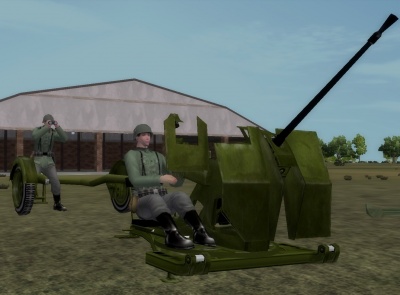Difference between revisions of "FlaK. 38"
| Line 37: | Line 37: | ||
|} | |} | ||
The Flak 38 (German: Flugabwehrkanone 38) was a German anti-aircraft gun designed in the late 1930s by Rheinmetall. | The Flak 38 (German: Flugabwehrkanone 38) was a German anti-aircraft gun designed in the late 1930s by Rheinmetall. Successor to the Flak30 with its dismal rate of fire, with a increase in its rate of fire from 120 RPM to 220 RPM the Flak 38 offered a vastly improved cyclic rate of fire. The Flak 38 was accepted as the standard Army anti-aircraft gun in 1939 and widely used on all fronts throughout the war. The Kriegsmarine employed it in Zwilling (b,vin) mounts while the Heer preferred the later Vierling mounts both towed and mounted on armored vehicles. Its service life began however as a single-barrel towed gun and was virtually indistinguishable from the Flak 30. | ||
=Game Play= | =Game Play= | ||
Revision as of 03:26, 30 August 2020
History=
| [[]] | |
| Main Gun Optics | |
| Specifications | |
| Designation | ? |
| Magnification | ? |
| Field of View | ? |
The Flak 38 (German: Flugabwehrkanone 38) was a German anti-aircraft gun designed in the late 1930s by Rheinmetall. Successor to the Flak30 with its dismal rate of fire, with a increase in its rate of fire from 120 RPM to 220 RPM the Flak 38 offered a vastly improved cyclic rate of fire. The Flak 38 was accepted as the standard Army anti-aircraft gun in 1939 and widely used on all fronts throughout the war. The Kriegsmarine employed it in Zwilling (b,vin) mounts while the Heer preferred the later Vierling mounts both towed and mounted on armored vehicles. Its service life began however as a single-barrel towed gun and was virtually indistinguishable from the Flak 30.
Game Play
In World War II Online you should deploy this gun to provide a close-in anti-aircraft umbrella over attacking forces. Try to set up in a brush line or in trees behind your main advance, where your HE firepower will not only be useful against enemy aircraft, but can also provide heavy fire support for your advancing infantry and defence against light AFV's. It is slow to limber/unlimber, so it is a good idea to restrict your fire to limit the ability of roaming enemy infantry or vehicles to find you.
The high rate of fire means that you need to conserve your ammo and fire heavily only when you are certain to hit. The high rate of fire does help you to "firehose" your salvo onto the target and, when aim is true, deliver a powerful Punch. Clip reloading is also slow. Keep careful track of your ammunition status so you do not find yourself facing down an enemy tactical bomber with nothing to shoot.
- See more in the AA guide - AirQuake! The AA gunner's guide to an empty sky
